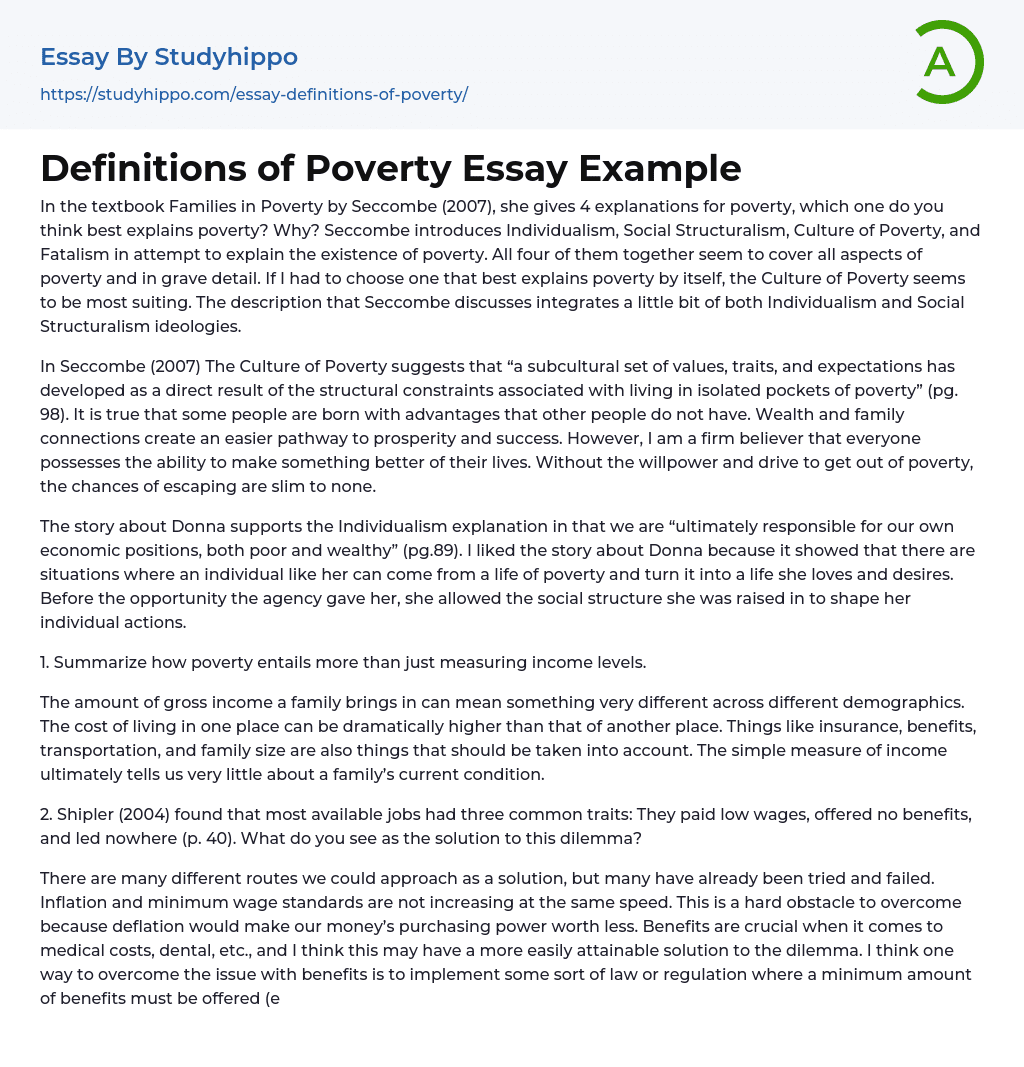In the textbook Families in Poverty by Seccombe (2007), she gives 4 explanations for poverty, which one do you think best explains poverty? Why? Seccombe introduces Individualism, Social Structuralism, Culture of Poverty, and Fatalism in attempt to explain the existence of poverty. All four of them together seem to cover all aspects of poverty and in grave detail. If I had to choose one that best explains poverty by itself, the Culture of Poverty seems to be most suiting. The description that Seccombe discusses integrates a little bit of both Individualism and Social Structuralism ideologies.
In Seccombe (2007) The Culture of Poverty suggests that “a subcultural set of values, traits, and expectations has developed as a direct result of the structural constraints associated with living in isolated pockets of poverty” (pg. 98). It is true
...that some people are born with advantages that other people do not have. Wealth and family connections create an easier pathway to prosperity and success. However, I am a firm believer that everyone possesses the ability to make something better of their lives. Without the willpower and drive to get out of poverty, the chances of escaping are slim to none.
The story about Donna supports the Individualism explanation in that we are “ultimately responsible for our own economic positions, both poor and wealthy” (pg.89). I liked the story about Donna because it showed that there are situations where an individual like her can come from a life of poverty and turn it into a life she loves and desires. Before the opportunity the agency gave her, she allowed the social structure she was raised in to shape her individual actions.
1. Summarize
how poverty entails more than just measuring income levels.
The amount of gross income a family brings in can mean something very different across different demographics. The cost of living in one place can be dramatically higher than that of another place. Things like insurance, benefits, transportation, and family size are also things that should be taken into account. The simple measure of income ultimately tells us very little about a family’s current condition.
2. Shipler (2004) found that most available jobs had three common traits: They paid low wages, offered no benefits, and led nowhere (p. 40). What do you see as the solution to this dilemma?
There are many different routes we could approach as a solution, but many have already been tried and failed. Inflation and minimum wage standards are not increasing at the same speed. This is a hard obstacle to overcome because deflation would make our money’s purchasing power worth less. Benefits are crucial when it comes to medical costs, dental, etc., and I think this may have a more easily attainable solution to the dilemma. I think one way to overcome the issue with benefits is to implement some sort of law or regulation where a minimum amount of benefits must be offered (excluding self employed individuals).
Personally, my mom works for a hospital and the benefits she receives for our family outweigh her actual salary. Though many individuals are stuck in “dead end jobs” that may not be going anywhere, that is something left up to the individual person. Work is scarce in our economy today, and majority of people who are employed should feel lucky or potentially steer towards a different
career path.
3. Nine out of ten Americans believe the federal government has a responsibility to alleviate poverty. A strong majority believes that government should do more, not less, to help people move from welfare to work by providing skills needed to be self-sufficient. (Lake, Snell, Perry & Associates, January 2002). Do you think the "haves" (i.e. the rich) should be responsible for the "have-nots" or should it solely be the responsibility of the government? What do you think is the cut off point (if there is one at all), and does too much 'taking care of' change the ideals of American culture, or does it incorporate the very essence of what America stands for? It is a very fine line that we are struggling with. What are your thoughts?
I do not believe the “haves” should be responsible for the “have-nots”. Regardless, the “haves” will continue to contribute a large part of the responsibility through their taxes. I think it is important to transition the focus from putting more funding in welfare programs towards the skills themselves needed to be self-sufficient, rather than just providing for them. The need for education or skill training is a major problem for people in poverty. I would not feel right putting a “cap” on the amount of welfare allotted. I think by “taking care of” everyone changes the ideals of American culture for the worse. Yes, America is the land of equal opportunity but I think that can be taken too far if the opportunity is just handed to everyone.
- Overpopulation essays
- Homelessness essays
- Hunger essays
- Dumpster Diving essays
- Homelessness In America essays
- Auction essays
- Balanced Scorecard essays
- Battle essays
- Business Plans essays
- Expense essays
- Income essays
- Intranet essays
- Maintenance essays
- Net Income essays
- Security Guard essays
- Simulation essays
- Singapore Airlines essays
- Abortion essays
- Abuse essays
- Animal Rights essays
- Animal Testing essays
- Assault essays
- Bullying essays
- Controversial Issue essays
- Crash essays
- Cyber Bullying essays
- Feminism essays
- Human Rights essays
- Immigration essays
- Inequality essays
- Poverty essays
- Prejudice essays
- Racism essays
- Torture essays
- Violence essays
- Activity essays
- Believe essays
- Comfort Zone essays
- Dance essays
- Fashion essays
- Fishing essays
- Fitness essays
- Freedom essays
- Habits essays
- Healthy Lifestyle essays
- Hobby essays
- Hunting essays
- Interests essays
- Justification essays
- Moment essays




